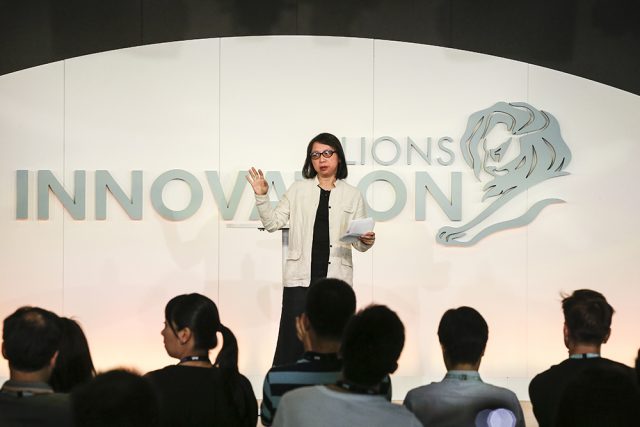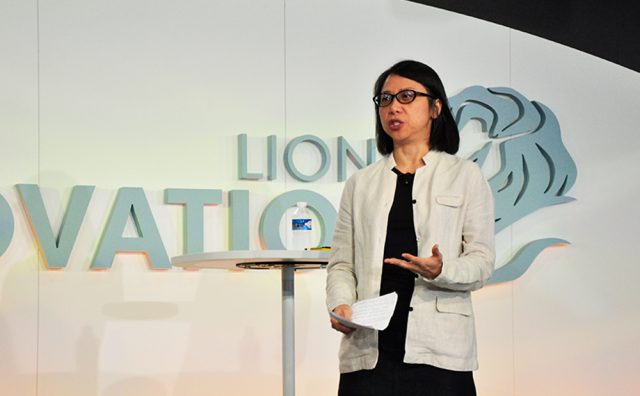“可能我是整个戛纳创意节这一周里唯一在谈论失败的人”,李倩玲说道。在戛纳创意节舞台上,她讲述了自己的第一次创业在一年半后陨落的原因。
李倩玲很快就把第一次失败带来的经验用到了第二次创业里,这一次她做的是帮助创业公司成长的战略孵化器。SHP+采访了这位创业企业高管,聆听她讲述了自己如何利用第一次创业的经验教训,来避免重蹈覆辙。
“I’m probably the only person the entire week at Cannes who is talking about failure”, says Bessie Lee, explaining on the Cannes Innovation stage why she closed her first independent business after just 18 months.
SHP+ sat down with the executive and entrepreneur to discuss the importance of the lessons learned first time around, and how they are informing her second venture, a strategic incubator designed to help new startups grow.

Bessie Lee speaks on the Innovation stage at Cannes Lions 2016
“在中国,多数干这一行的人都称我为数字大师. 我还真的挺傻挺天真,信以为真了。”
“Most of my fellows in the industry in China would call me a Digital Guru. I was stupid and naive enough to actually believe it.”
大学刚毕业,李倩玲就加入了全球最大的营销传媒控股公司,一做就是23年,到了2013年,她对广告公司感到了厌倦,本着“主宰自己的命运,做一些可以自己把控的事情”的召唤,她决定做出改变。
李倩玲也公开承认自己是一个“小电子物件控”,她定期就中国的数字产业发展和熙熙攘攘的创业局面发表自己的意见。她坦言,“在中国,多数干这一行的人都称我为数字大师 – 我还真的挺傻挺天真,信以为真了。”
2011年,微信作为社交媒体品台上线。到了2013年,微信就已经开始提供企业账号。智能手机在中国遍地都是,这让李倩玲深信社交电子商务将成为未来的趋势。于是,她投身一家合资公司,鼓励各大品牌摒弃实体积分卡,鼓励他们在微信上创建虚拟积分项目。
Lee joined the world’s largest marketing communications holding group immediately after graduate school, where she worked for 23 years until 2013 when, fed up with the agency world and driven by “a calling to be the owner of my own destiny, to do something where I can call the shots” she decided to make a change.
As a confessed “gadget-freak” who regularly publishes her opinions on China’s digital developments and bustling startup scene, Lee admits, “Most of my fellows in the industry in China would call me a Digital Guru – I was stupid and naive enough to actually believe it.”
WeChat launched as a social media platform in 2011 but by 2013 was beginning to offer corporate business accounts. China’s high penetration of smartphones convinced Lee that social commerce was the future. She entered into a joint venture that sought to encourage brands to dump physical loyalty cards and create virtual loyalty programs on WeChat instead.
“我以为我对这方面很了解,能把握时机,以为市场已经做好准备了,以为我的客户都很大胆很愿意冒险,但是我错了。”
“I made mistakes about what I thought I knew, about the timing, about what I thought the market was ready for, about how daring or risk taking my clients would be.”
虽然,社交电子商务自此成为微信不可或缺的一部分,但是,李倩玲坦言,努力说服微信和品牌营销人员接受它还为时过早,还要等上一年半。
另外,对李倩玲(现年40几岁)这样的“数字移民”一代来说,他们并没有成长在数字时代,她的大量时间都浪费在向她年轻的“数字原生代”团队传达她到底想要什么上,“我脑海中的想法跟他们的观念完全不同。像是语言不通一样。”
虽然李倩玲多年来积累了数字平台广告营销人员的信任,但是她的新业务没人买账。相反,她发现自己不得不苦苦对着她根本不熟悉的技术团队讲述她那复杂又从来么有人尝试过的概念。
Though social commerce has since become integral to WeChat, Lee admits they were 18 months too early to the party, struggling to convince WeChat and brand marketeers to adopt the ideas.
Lee explains that as a “digital immigrant” that didn’t grow up with digital, much time was wasted trying to communicate what she wanted from her team of young “natives”.
Moreover, the trusting relationships that Lee had developed over years with media platform advertising salespeople were useless in the new business. Instead, she found herself struggling to communicate complex, untried ideas to unfamiliar tech teams.

Bessie Lee, founder & CEO, withinlink
李倩玲和合作伙伴立马决定不能再多浪费时间和金钱。她发现那些缺乏经验的创业公司通常都很不淡定,“即使知道他们只是在苦苦挣扎,也不愿意放手……还是愿意相信公司在一两年内会看到希望。”
李倩玲对此展现的决断力,创立了良好的公司架构,将原本可能会遭受更多损失的公司融入到一家拥有多年经验的大公司。她觉得,很多创业公司都低估了决断力的价值,认为大公司的生活“实在无聊”。利润和得失管理尤为重要。“就我的经验来看,很多(创业公司)都是奔着钱去的。不会去想下一年公司如何发展。他们缺少风险评估技能。”为了学习这些基本技能,她建议年轻企业家可以找一个企业高管当导师。相反如果不去学习这些基本技能,就会造成潜在隐患,“从最开始就没能在掌握好这些基本技能……多年以后这些落下的功课回头就会找上你。”
Lee and her partner promptly decided to close before wasting any more time and money. She finds less experienced startups are often not so clinical, “They have an issue with letting go, even though they know they are struggling… They tend to believe that there will be hope in a year or two.”
Lee credits the decisiveness and sound structuring of the business that mitigated a potentially more damaging venture to years of experience with a big corporation. She feels that many startups underestimate the value of such skills, dismissing big corporate life as “really boring”. Particularly important is profit and loss management, “In my experience, a lot of [startups] look at a cash basis. They don’t envision what next year is going to be like. There are no risk assessment skills.” To learn the fundamentals, she advises young entrepreneurs to find a senior corporate executive as a mentor. The alternative, she says, is potentially disastrous, “If you don’t do the fundamentals right from day one…years later it will turn around and bite you badly.”
回过头来看,李倩玲意识到,她的失败之处在于没能利用自己工作中积累的广泛的技能和资源还有经验,“我就是为了与众不同而与众不同”。于是,她下定决心,下一次的创业要抓住自己的优势专长:从自己的人脉和经验来看,她十分了解客户和广告公司在聚集人气的时候到底能承受多少压力。
虽然中国并不缺少风投,但是投资人给完钱之后往往就不参与了。李倩玲看到,风投人往往不会提供战略资源,包括营销方面的人脉,经验和专业技能等,所以这中间存在着一个缺口,如何能促进业务增长。
In hindsight, Lee realized she had failed to leverage the broad skills, assets and experience she had accrued across her career, “I was just trying to do something different for the sake of being different”. She determined that her next venture must play to her strengths: through personal relationships and experience, she had a deep understanding of the pressure points for clients and agencies struggling to gain traction with consumers.
While there is no shortage of venture capitalists in China, their involvement usually stops at investment. Lee saw a gap for a financial partner that could also provide strategic resources – marketing industry contacts, experience and expertise – to help budding businesses to grow.
“懂得我们在做什么的公司并不是为了钱,而是在寻找一般的金融投资者无法提供的东西”。
“Those companies who understand what we do are not looking for money. They are looking for something that their financial investors cannot provide”.
2015年2月,李倩玲在上海成立了withinlink公司,这是一个精品孵化器,专门针对创业公司,针对中国的市场商人和广告公司,打造产品、解决方案以及服务,主要应对四大软肋:移动设备、电子商务、社交媒体和数据。
李倩玲自己并不是风投人,她的投资都是自掏腰包。虽然withinlink也会购买一些创业公司的股权,但是同一般的风投相比,数额很小,一般都是2000-20玩美元之间,占公司股权的0.6%-5%。她解释道,“懂得我们在做什么的公司并不是为了钱,而是在寻找一般的金融投资者无法提供的东西”。
In February 2015, Lee founded withinlink, a boutique incubator based in Shanghai working with startup businesses creating products, solutions or services across four weak areas for marketeers and agencies in China: mobile, ecommerce, social and data.
Lee is not a venture capitalist and the money she invests is her own. Though withinlink does take buy equity in the startups, the sums paid are small compared to usual VC investments, anything from US$2000 to $200,000, typically representing between 0.6% and 5% of the companies. “Those companies who understand what we do are not looking for money,” she explains, “They are looking for something that their financial investors cannot provide”.
现在公司做的还不错。十家创业公司的整体估值将近6亿美元,withinlink的回报收益率接近500%(按照现有估值来看)。今年年初,他们把其中一家公司的一部分以初始投资250倍的价值卖出,另外两家公司明年即将上市。而她的团队还将两家“状况惨重”的公司扭转成良性发展的公司,除此之外,还有一家公司最近在Indiegogo上成功实现融资。
It is so far so good for the company. Its ten startups currently have a combined valuation of close to US$600m and withinlink’s ROI is close to 500% (based on current valuations). Earlier this year it partially exited one company to the tune of 250 times initial investment, while two other companies are set to go public next year. Lee’s team was able to transform two more from a “disasterous situation” into a healthy one while another recently completed a successful Indiegogo campaign.

One of withinlink’s portfolio companies, Bowhead Technology created Gululu, “a sleek design bottle combined with a Tamagochi-like smart toy that keeps kids hydrated and healthy’

现在,李倩玲收到了几十个充满希望的年轻创业者的申请。而评估始于对公司创始人的评估,包括“他们的性格、魅力、对待公司和对人的态度”。她发现,大多数公司要么缺少优秀的商业管理技能,要么就是听不进去别人的意见。而且这些人的想法都太短浅,以钱为主,“他们想要从你这拿一些钱,提升公司估值,之后就可以再找其他投资者了。他们不关注坚实的产品。”她还说道,在中国,很多人创业都是为了钱。“企业估值都很疯狂。有了估值之后,就叽叽喳喳,觉得如果百度、阿里、腾讯能买投钱的话,就不用愁了。”
最后,李倩玲给我们传达了两点。她认为,创业公司的老板应该自己出钱投资,如她所言,这样会让这些人更能担起责任,更有决心取得成功。“如果自己不投钱的话,怎么能说服其他人给你投钱呢?”
现在李倩玲有了自己的第二次创业,她说,“只要你有决心,什么时候创业都不晚”。那她对第一次的创业所付出的努力和损失的资金是否感到遗憾呢?她的想法是,“很高兴,我失败了。要不然我也不会清楚地认识到我需要二次创业。失败带来的经验要比钱有价值多了。”
These days, Lee receives dozens of applications from hopeful young entrepreneurs. The evaluation process begins with the founder, “their personality, charisma, how do they treat their business and their people”. The majority she finds either lack the requisite business management skills or are deaf to advice. Moreover, their thinking is often short term and money-driven, “They want money to get the valuation up in order to pitch to other investors. It’s not about a solid product.” She adds that, in China, a lot are in for the money. “The valuations are crazy. Once they get the valuation, they get the buzz, thinking ‘if BAT [Baidu, Alibaba or Tencent] buy me, I’ll be fine”
Lee parts with two final messages. She believes startup founders should invest their own money, as she has, to make them more accountable and determined to succeed. “If you don’t put your own money in, how are you going to convince other investors to put money in?”
Now on to her second startup, Lee says, “It’s never too late to start a company, as long as you have the determination to do it”. Does she have any regrets about the first effort and the money she lost? “I am glad I failed. If I hadn’t, I would not have the clarity that I needed for my second startup. The lessons I learned were worth so much more than the money.”




 BAM Music Library Brings Edgy, Indie Sounds to Chinese Creatives
BAM Music Library Brings Edgy, Indie Sounds to Chinese Creatives
